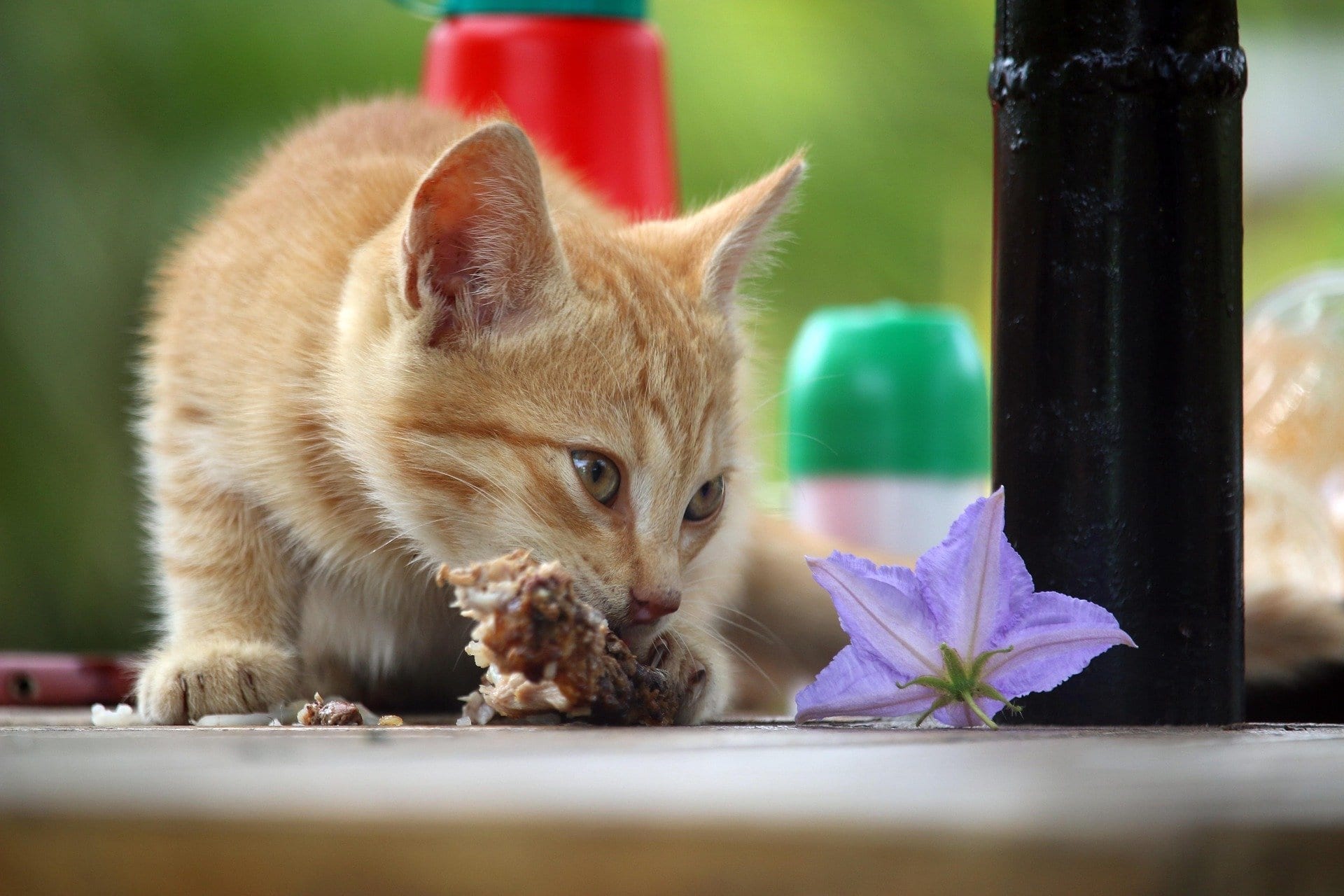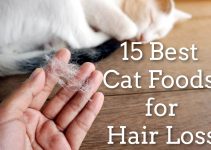Even though cats are carnivores, there is still a big controversy about whether or not they should be fed raw chicken. Opinions are divided between feeding your cat raw meat and being entirely against this idea. Since cats are very different from humans, it is known that they have teeth that help them rip apart and shred raw meat, such as raw chicken. So, is it safe to feed your cat raw meat? And can cats eat raw chicken?
NOTE: We want to inform our blog readers that before we publish any article, the team “Proudcatowners” does deep research based on experience and knowledge about cats and everything related to them, to guarantees reliable and precise information, satisfy the readers is our first priority.
What are the common foods for cats?
Usually, cats tend to eat everything that is meat-related since they are carnivores, and their meals are mostly made up of proteins, such as:
- Beef
- Fish
- Canned fish
- Chicken
- lamb
- Cooked eggs
Can cats eat raw chicken? is it safe?
Cats can eat raw chicken because they are carnivores, it is safe for them. Their teeth can entirely tear through raw chicken meat and even bones. Their digestive system is also built to cope with raw diets easily and allows them to digest raw meat in 12 hours. However, there are some threats to your cats when eating raw chicken, or meat in general, which are caused by some factors:
Grounded meat:
Buying ground or minced meat from the store and providing it to your cat is something to avoid doing. During the grounding process, bacteria that lie on the outer layers of meat will be mixed with every other part of the raw chicken meat you are buying.
Not only that, but the bacteria and germs that are in the minces at the store sat there for days and had more time to develop, which poses even more danger to your cat. So, avoid buying prepackaged raw minced chicken.
Bacteria:
Different kinds of bacteria can develop on raw products of any sort. In the case of raw chicken, bacteria mostly grow on the outermost layers of it, so despite the harmfulness of this bacteria, you can get rid of it by carefully washing the raw chicken before giving it to your cat. Getting rid of these harmful microorganisms should not be a problem, as long as the meat is fresh, and it comes from a disease-free animal.
Should I debone raw chicken meat before feeding it to my cat?
Deboned chicken is healthy for cats, especially for their everyday diet. However, if the chicken is not correctly deboned and cleaned, your cat might end up swallowing small bits of bones, which can cause considerable damage to its internal organs, and therefore put the cat at fatal risk.
Are ground chicken bones healthy for my cat?
Ground chicken bones are a great source of essential calcium or your cat, but you must make sure that they are carefully ground so that you avoid small bits that can harm your cat’s internal organs. However, when providing your cat with ground raw chicken bones, it is recommended to also provide it with non-ground bones as well at least three times a week, unless in cases of sickness or dental issues.
Chicken bones can function as a great tool to help clean cat’s teeth after each meal and keep healthy gums, therefore when providing them with ground raw chicken bones only, your cat is missing out on those benefits.
Providing your cat with large quantities of raw chicken bones can cause constipation, so be careful of how much you give them.
Which part of the chicken is most nutritious for my cat?
People usually tend to feed their cats raw chicken breasts. Lean muscle meat is an essential part that your cat needs and requires. It is the most vital one. Lean muscle meat is rich in protein that your cat needs the most, in addition to amino acids, such as taurine, and different minerals. All of these components make the muscle meat the most nutritious part of raw chicken and the one which your cat would benefit from the most.
Can raw chicken invoke salmonella in my cat?
Salmonella is a bacterium that is reported as the most common and frequent cause of sicknesses related to sickness. It is usually the result of slaughtering animals using improper ways.
Causes of Salmonella:
According to PetMD, there are more than 2000 types of salmonella, Gram-negative enterobacteria. The infected cat usually carries two or more kinds of Salmonella bacteria, which are causing the disease. Sometimes cats that are receiving antibiotics can be at an increased risk of salmonellosis because the healthy bacteria in the digestive tract might become imbalanced.
Symptoms of Salmonella:
If the cat’s condition is severe, the symptoms will show more. However, if the cat is at the early stages of the disease, there might be common symptoms only.
- Fever
- Shock
- Lethargy
- Diarrhea
- Acute vomiting
- Anorexia and loss of appetite
- Weight loss
- Dehydration
- Skin disease
- Abnormal discharges from the vaginal area
- Traces of mucus in the litter box or when discharging in general
As mentioned above, the severity of the cat’s condition determines the severity of symptoms, the following are included in this case:
- Extreme fever
- Severe weight loss
- Blood loss
- Infections
- Sudden diarrhea, for extended periods
What should I do?
If you see your cat starts showing one or more of these symptoms, you should take it to the veterinarian immediately. Usually, he will examine the cat and run some physical tests, trying to locate any physical or pathological findings.
Some cats will show clinical symptoms if infected, such as gastroenteritis, while others do not. The veterinarian will probably try to rule out other diseases that might evoke the same symptoms as well.
What is Gastroenteritis?
Gastroenteritis is the inflammation of the cat’s gastrointestinal tract, which means the cat’s stomach and intestines.
Causes of Gastroenteritis:
This disease can be due to small causes such as a change in your cat’s diet, or more complex causes such as infections.
- Sensitive reactions to certain medications
- Hyperthyroidism
- Infections caused by bacteria
- Being infected by a virus
- Intestinal blockages
- Being exposed to some toxins
- Abdominal disorders, such as pancreatitis
- Parasitic infections
- A change in diet
Symptoms of gastroenteritis:
If your cat has gastroenteritis, you will notice it acting a bit strange, being lazy, and having very low energy. These are some of the common symptoms your cat might display:
- Lethargy
- Vomiting
- Dry heaving
- Constant gagging
- Acute fever
- Weight loss
- Severe pain and/ or tenderness in the abdominal area
- Diarrhea
Should I be worried?
Some of the symptoms mentioned above might seem simple and can be treated at home, and your cat might show signs of vomit from time to time. However, if you notice these symptoms, it is best to rush your cat to the veterinarian, because he would know what to do, even if the cat’s condition is not as severe.
Gastroenteritis is a serious disease and can lead to dehydration if not treated, and it can also evoke other illnesses in the long run.
MEOWtresting Benefits of feeding raw chicken to your cat:
- It is an excellent source of protein
- It contains the needed amino acids to optimize your pet’s health
- Raw chicken meat is low in carbohydrates, which decreases digestive problems and unhealthy weight gain
- Raw chicken bones, especially drumsticks, wings, and fresh chicken necks can function as a fantastic tool in maintaining your cat’s oral health, clean teeth, and healthy gums
- Cures bad mouth odor
- Minimize, if not cure allergies
- Enhances the cat’s metabolism
- A stronger immune system
- Using the stool becomes more organized and less smelly
- Raw chicken has a higher rate of fluid content, which helps in keeping your cat hydrated and avoiding any complications due to dehydration.
Raw Vs. Cooked chicken
Cooking the chicken before giving it to your cat can eliminate health problems that can be caused by bacteria, but so does washing chicken meat thoroughly and providing it to your cat raw.
Sensing the scent of boiled chicken would make your cat rush towards you, and it is great when supplied with rice and other nutritions, especially in cases where your cat is suffering from diarrhea.
Cats are known to enjoy eating tuna as treats, boiled chicken can also serve as an excellent treat for cats.
Cats enjoy warm food, in-room temperature, so cooking/boiling chicken or not is a matter of preference because in both cases, they have benefits.
My cat is refusing to eat raw chicken meat:
If your cat refuses to eat, you must first notice if it is displaying symptoms such as nausea, vomiting, or being lethargic. If it is the case, you should set an appointment with the veterinarian.
Nausea can usually be because of hairballs, however, being lethargic is a bad sign and requires a medical checkup.
If your cat does not display any symptom, maybe it is bored of the same repetitive diet, or it lost its appetite for a bit. Try making a healthy balance change in your cat’s diet. Providing a variant meal or diet is excellent, as long as it is healthy.
Are processed foods unhealthy for cats?
As Joanna Blythman said, “Manufactured food relies on words to identify itself. Real food needs no explanation.”
In the same case as humans, processed foods can also be harmful to cats. It has been proven that highly processed foods can be the cause of chronic inflammation, as well as aggravate it.
Despite the danger of these foods, many veterinarians still recommend such diets to have a balanced and complete diet. Dr. Steve Marsden declared that most veterinarians spend most of their time treating inflammations, using the same classic anti-inflammatory medications, while the real problem lies within the diets that some of them are promoting and selling in their front desk.
Consequences of processed foods on cats:
According to Dr. Becker, processed food is biologically inappropriate for cats. Many companies that produce foods, meals, and diets for cats usually use corn, rice, or potato -which are already processed differently nowadays – as a base for their products.
These components are then mixed with proteins of low quality and a mixture of various vitamins. The next step for these products is to process them once again at a very high level of temperature.
Even though cats can adapt and consume these products, it does not mean they are not harmful to them. Cats are just able to overlook the deficiency of nutritious factors. These processed foods have a very negative aspect on cats because they provide a biologically unbalanced diet. This diet would abuse the cat’s system and can end up causing many diseases.
The fact that these foods are harmful and biologically unbalanced, but do not cause immediate harm, or immediate death, made these processed pet foods pass as good for cats. As Dr. Richard Patton puts it, “nutrition only becomes a problem when there is a crisis.”
Consequences:
- Chronic inflammation
- Diabetes
- Arthritis
- Kidney disease
- Heart disease
- Low nutrition
- Low immunity
- Metabolic syndrome
- Obesity
- Cardiovascular disease
- Cancer
What should I do to protect my cat?
As we know, feeding your cat only fresh foods, and raw meat, such as chicken can be quite expensive. However, there are ways to corporate these meals in your cat’s diet without going broke.
- Including one fresh meal per day
- Eliminating 25 to 50 percent of processed food from your cat’s diet and replacing it with fresh food
- Make treats out of fresh food instead of processed treats
- Make the best out of shopping sales, buy fresh food in bulk to reduce the cost and save money
- Prepare a homemade fresh meal for your cat, following a balanced recipe
What are the fresh foods that I can feed my cat?
Some domestic cats could still go out hunting for rats to satisfy their nutritional needs, however, not all domestic cats do that, which is why you should try to provide a balanced meal when feeding it fresh homemade or natural foods. You should be careful when making a homemade meal for your cat, that it is not unbalanced or lacking in nutrition, because that also, can be bad for their health.
Fresh meat:
Since cats are carnivores, raw meat is a perfect source of protein and a whole section of their balanced diet. Avoid feeding your cat pork, bacon, ham, and any other pig-related products. Here is a list of meats that are good for your cat, and which it would enjoy:
- Chicken
- Rabbit
- Fish
- Beef
- Lamb
- Pigeon
- Eggs
- Seaweed
- Vegetable
Vegetables should be raw, fresh, or cooked, whether steamed or boiled. It is also best for the cat to be provided with mashed vegetables because it helps with the chewing.
Dietary products
Milk and cheese can be a healthy addition to your cat’s diet, however, be careful that the milk is fresh. Pasteurized milk is not as healthy as fresh unprocessed goat’s milk, cow’s, or sheep’s milk.
Can raw fish make my cat sick?
Some raw fish, especially freshwater fish, such as Goldfish, Carp, Barb, shellfish such as shrimps, prawns, mussels, and others, may contain Thiaminase. This later is an enzyme that works on breaking down Vitamin B1, also known as Thiamine.
High levels of temperature destroy this enzyme. Cooking on high heat can also destroy Thiamine itself, as it can be lost in cooking water as well. Cooking the fish before feeding it to your cat eliminates this danger, whether frying it, boiling it, or steaming it.
Can cats suffer from food allergies?
Cats can end up developing a sensitive or intolerant stomach due to certain foods. Many cat owners complain about their cats vomiting continuously, and it can be due to various causes, some of which are food allergies and food intolerance.
Are food allergies the same as food intolerance?
Though these two might have similar symptoms and sound similar, however, they are not the same thing.
Food Allergies:
Cats usually develop some food allergies between the age of 2 and 6 years old. In addition, cats do not often show symptoms unless they are repeatedly exposed to the product they are allergic to. As the misconception goes, cats are allergic to grain substances, such as corn, however, cats develop most allergies to protein sources, such as canned or fresh fish, and chicken. Veterinary Practice News confirmed that most pet parents misdiagnose their cat’s allergies.
What are the common food allergies for cats?
Cats can develop allergies to different foods actually, and mostly protein sources, but the most common ones are the following:
- Chicken
- Beef
- Fish
- Eggs (cooked eggs)
What are the reasons that make a cat develop food allergies?
- Flavor enhancers
- Foods that are biologically inappropriate, which cats do not usually eat
- Preservatives in foods
- Dyes
How do I know if my cat has allergies?
As mentioned before, your cat would not be showing symptoms unless it is constantly exposed to that source, and when it does show symptoms, sometimes, they are hard to spot, and they can affect both internal and the skin as well. These are the most common symptoms:
- Loss of weight
- Anorexia (Loss of appetite/Avoiding food)
- Vomiting
- Diarrhea
- Irritated/itchy skin
- Reddened skin
- Hair loss
- Small lumps on the skin filled with fluids
- Ear inflammation
Food Intolerance:
Unlike food allergies, food intolerance can occur to cats of all ages, and it can be due to many reasons, some of which are:
- Food additives
- Food poisoning:
Your cat can develop a sensitive stomach if exposed to one of the mentioned below, and it causes a direct reaction on the cat.
- Consuming spoiled/expired foods
- Consuming high qualities of Vitamin A or Vitamin D
- Ingesting certain toxic plants such as Amaryllis, Autumn Crocus, Azaleas, Rhododendrons, and rhubarb. This can lead to gastrointestinal irritation. This may cause gastrointestinal irritation
Symptoms of food poisoning:
- Vomiting
- Diarrhea
- Weakness
- Heavy salivation
- Extra agitation
- Symptoms of food intolerance:
- Passing out gas
- Making loud gut sounds
- Frequent bowel movement
- Diarrhea
- Skin irritation
- Loss of appetite
- Weight loss
Should I add supplements to my cat’s diet?
You must be very careful when handling cat food supplements because if you add too much, or you over supplement your cat’s diet, you might cause health problems for it.
Vitamins B and C are considered mineral soluble when adding it to the diet, the cat’s body would use what it needs and eliminate the rest of it in the urine. These two vitamins are not very dangerous and do not pose severe health risks, except loose bowels in some cases.
Vitamins A, D, E, and K are fat-soluble. The overuse, or over supplementing using these vitamins can lead to severe health issues for your cat, which can aggravate if not treated immediately.
Supplements should only be used when needed, to make up for a certain nutritious lacking. Excessive use of them, especially randomly, can and will put your cat’s health at significant risk.
Human foods that are good for cats as well:
- Vegetables
- Whole grains
- Avocados
- Cheese
- Eggs
- Fish
- Meat
Foods that your cat should NOT eat:
- Chocolate
- Alcohol
- Bread dough
- Onions and garlic
- Grapes and raisins
Conclusion:
Cats are carnivores by nature, so raw chicken meat is an essential element and a great protein provider in their diet. However, we should be careful in handling them. We must provide them with clean meat, from a disease-free animal, we can either give it to them raw or cooked/boiled, as well as avoid certain foods. If raw chicken is not well handled, cleaned, or deboned properly, it can lead to health problems for your cat, such as salmonella.
There are certain human foods that are healthy for your cats, as there are others that can cause your cat great harm. Cats, just like humans, can suffer from food allergies and food intolerance. If you see your cat displaying any of the symptoms mentioned above, you should take it to the vet. Even though cats are carnivores, we should still treat them with care, and try our best to provide them with fresh healthy foods, and balanced diets.








